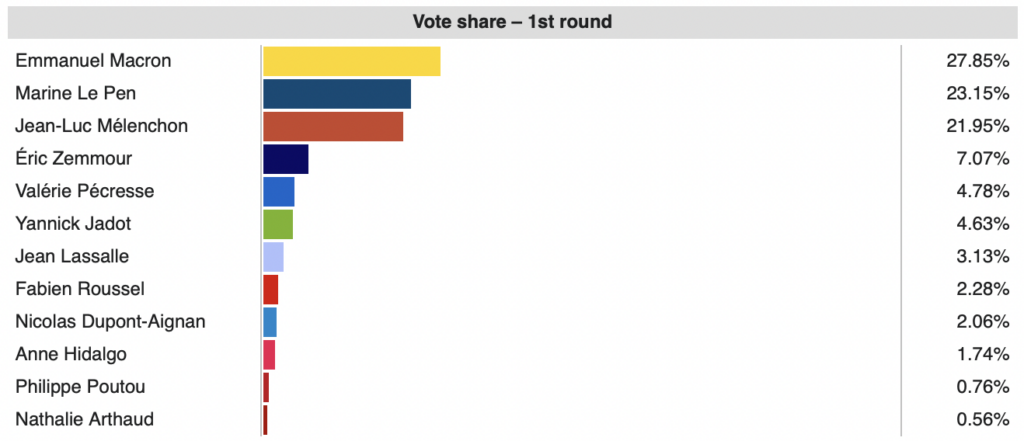Institutions Matter, French Edition
How rules shape the game.

Over at his Substack blog Slow Boring, Matt Yglesias offers what he deems “Some boring takes on the French election.” There’s a lot to his post but I want to focus mostly on his section Institutions and tactical voting matter.
It’s striking the extent to which major post-election media narratives are heavily shaped by institutional quirks and tactical voting considerations that are technically irrelevant to the subject of the narrative.
For example, in 2022 Le Pen got the best-ever result for the French far-right. But also in 2022, far-left candidate Jean-Luc Mélenchon improved on his votes from the previous election, finishing just a hair behind Le Pen. And he did so despite the presence of a number of minor left candidates who clearly had no hope of winning. If some of those Jadot/Hidalgo/Roussel/Poutou/Arthuad voters had gone for Mélenchon instead, the story of the first round would have been a breakthrough for the French far-left.

Indeed, because the long-predicted outcome of a Macron-Le Pen runoff occurred, little attention in the American press was given to just how close Mélenchon came.
In this scenario, not making the runoff would have been a humiliating defeat for Le Pen even though she would have secured the same number of votes. A completely irrelevant consideration — Mélenchon’s struggle to fully consolidate the left-wing vote — was critical to our understanding of the outcome for Le Pen. Of course Mélenchon would’ve gotten crushed in the second round, but coverage of the race would have had a totally different tenor, focused on the question of whether a far-leftist could appeal to Le Pen voters rather than on whether Macron could persuade young leftists to vote for him.
But one key reason Mélenchon got so close to Le Pen is that seven percent of the electorate voted for Éric Zemmour, who ran to Le Pen’s right. That in turn reflects a crucial dynamic for understanding why Le Pen did as well as she did in the second round: she moved quite a bit to the center.
This is followed by a discussion of tactics particular to France, which he extrapolates to the US case. It’s interesting and debatable but, again, my interest here is in the institutional arrangements—the degree to which the rules of the game shape the outcome. While the French system is far more representative than ours, in that new parties and coalitions can much more easily emerge, the fact that the cutoff for the second round is two means that “spoiler” candidates can have a significant impact.
After a long discourse on the particular tactics and policy positioning of the French and American parties, Yglesias returns to the institutional discussion:
France has a two-phase presidential election — a broad multi-candidate first round, followed by a runoff between the two top finishers. America has a different kind of two-phase system — first a pair of multi-candidate primaries and then a general election.
I’m not quite sure that the mutatis mutandis works this way but it’s plausible:
If you ran the French results through the American system, Le Pen would have won the primary on the right and Mélenchon would have won the primary on the left, with Macron voters split between the two parties. And all signs are that Le Pen would have won the general.
Again, I’m not sure this is quite right. The fact that so many fringe parties exist makes turning out to vote in the first round much more attractive. A lot of those folks probably wouldn’t even show up in a primary system that will inevitably produce a more bland candidate. (Not to mention that the US primary system, with its serial nature, isn’t truly equivalent to the French national first round.) Beyond that, Macron, who was a leader in the Socialist party not that long ago, would have likely tacked further left in a primary to represent the leftist coalition.
Regardless, the point remains: the rules of the game very much dictate not only the outcome but who plays, using what tactics.






Also, good thing France doesn’t have an electoral college to negate the democratic will of the people, and instead they who get the most votes wins. Wow, what a concept.
Rather amusing to see some anti-Trump conservatives urging Biden to follow the French model and emulate Macron — specifically with running right on immigration.
Although Democrats will be demagogued on immigration no matter what we say or do — because Republicans have no real interest in solving such problems and prefer to keep scaring up votes — I too would like to see the left offer a more cogent, clear-eyed, practical immigration message.
I’m sure anti-Trump conservatives will also follow the French model, emulate Macron, and thus support Democrats on universal healthcare, free college, and the Paris climate agreement, right? Right???
I’m puzzled by this. My impression is that spoilers have a much more significant impact when there are more than two candidates. I’m thinking of extremists like LePage in Maine who was successfully elected twice despite the majority voting against him. This seems a less representative result rather than a more representative one.
@MarkedMan: Apples and oranges. A LePage can win under our system because we tend to allow plurality winners. He got more votes than any other candidate; that the majority preferred someone other than him is irrelevant in such a system.
Or it means that there are real divisions in the body polictic being represented by those candidates. I think that the idea of a “spolier” candidate is problematic in that it assume that larger party have a right to those votes and would get them if only voters didn’t have more choices. Indeed, I would argue that the concpet is deeply American in the since that we assume two “real” choices and plurality winners. An advantage of two rounds is the so-called spoiler doesn’t lead to a plurality winner with a less than majority vote share. A coalition has to be built for round two.
Indeed!
@James Joyner:
I quote this just to underscore the difference between plurality-winners and absolute majority winners.
Maybe, but allowing a three-candidate second round would easily get you a plurality “winner” or the need for a third round.
@Steven L. Taylor:
Absolutely fair. Still, if there are seven flavors of Right parties and only three of Left parties, the results of winnowing the first round down to two may not represent the true will of the polity. We sort of saw that in the 2016 Republican primaries, where the non-Trump votes were split among a plethora of plausible candidates and the field didn’t winnow fast enough to prevent his win. Or, more obviously, with the Nader and Stein votes in the 2000 and 2016 generals.
@DK:
Would you care to expand on what that message would sound like and how it would evolve into policy? I ask because preFG, Republiqans and Democrats offered fairly similar sounding messages on immigration to the ears of this only slightly less conservative than before cracker. One of my disconnects with conservatism involved the policies sought not matching the rhetoric offered, in fact.
So, in the words of Eliza Doolittle in My Fair Lady “don’t talk… show me.”
“anti-Trump conservatives”
Just to clarify, there are no anti-Trump conservatives, there are anti-Trumpian rhetoric conservatives, but they want the same policies as their FG-following brothers; they just want to bring back dog whistles.
@just nutha:
I don’t think that’s right. It’s true that there’s a strong racist/nationalist/masculinist streak in American conservatism that Trump tapped successfully with his rhetoric. But his foreign policy, for example, is decidedly different from what we’ve seen from Reagan to Bush 41 to Bush 43 to McCain and Romney. A President Rubio or, hell, a President Cruz in 2017 would have been a very different animal than a President Trump—even though Rubio and Cruz soon beclowned themselves trying to ingratiate themselves with Trump and his base.
@Steven L. Taylor: It seems to me that in promoting multi-candidate runoffs you are over-valuing peoples ability to vote FOR whoever they want but dangerously under-valuing the ability of people to vote AGAINST someone they don’t want. LePage is instructive here. An extremist that a significant majority of people did not want in power, and many, many of them considered keeping him out to be the most important thing, but Maine’s system kept them from being able to cast such a vote and allowed a candidate with minority support and majority opposition to hold office for two terms.
@James Joyner:
I think that’s kinda @just nutha:’s point.
@MarkedMan: I’ll note that ranked choice does allow voting against, by ranking last. I expect most of us here are aware of DeUseless signing the bill that creates his election police force. The bill also prohibits ranked choice voting. Not only at the state level, but also in any county, city, or other election. Tampa tried to do a ranked choice election some years ago, but was unable to get required cooperation from the state.
@James Joyner:
But this is true for for virtually every non-incumbent candidate. With many candidates in the mix, they often don’t get a clear majority of primary votes until others drop out. Despite this you seem to seems to imply that Trump did not represent the clear majority of those that identify as Republicans. Was it just Republican primary voters that foisted an unpopular candidate on the rest of the Republicans? Sure doesn’t seem that way, as Republican turnout in the general was better than it had been for decades. Trump was their candidate and they were more enthusiastic, not less. And all polling evidence shows that he remained extremely popular with the Republican electorate, to the point that no meaningful opposition emerged for his re-election. There was no groundswell of support for anyone else, and because of that Trump sailed to victory in every primary and caucus. Every major Republican who tested the waters concluded they didn’t even have the remotest chance of defeating him. Trump was exactly what the Republican primary electorate wanted.
We can talk about systems that better represent the electorate but, at least among Republican voters, any more representative system would have yielded the same result. Trump is the Republican Party, and by that I mean he is the truest manifestation of what Republican voters want.
@gVOR08: Ranked choice, though, is just a faster way of winnowing down to a two candidate runoff. It is very different from the multi-candidate plurality election that was in force for LePage’s victories, and that’s why Maine change to ranked choice.
@DK: you rather badly misunderstand Macron. The French healthcare system of course is already there (having evolved from a mandated private system – really the US should have studied the early state of the French evolution rather than end-states to date) and the French uni system, Macron has rather pushing towards a badly needed flexibilisation (the general access again an already existing but dysfunctional state…
The Centre Right anti-Trump position translated to French state, in a lower case cosnervative would look similar to Macron.
The Left reaction that almost broke through as evoked by James was in fact very heavily due to Macron’s efforts to liberalise aspects of what you naively evoke – such as increasing “droits d’inscription” as free general Uni has proven inefficient and generally considered a failure as compared to the specialist schools that are insanely competitive.
So afraid your demarche falls on its face.
@James Joyner: “I don’t think that’s right.”
I wouldn’t imagine for even a second that you do. We’ll just have to disagree on this point.
Thing is, Macron is not a “continuity centrist”.
He’s a reformist smidge-left-of-centre type.
A more daring Mitterand, or a more analytic Tony Blair.
But also, being French, a republican nationalist and advocate of state action to adress critical problems.
His focus is on resolving issues that have been widely seen as nagging problems for France over decades: low relative productivity, related lack of domestic productive investment, high unemployment in marginalised groups, resulting social alienation, over extension of the regulatory state leading to reduced growth and potential corruption.
It is this challenge to established ways in regard of the economy and bureaucracy that have annoyed a lot of people. When an inefficiency benefits you, you are unlikely to welcome it’s being attacked.
See e.g. public sector workers retiring at 55 due to disability; which disability tended frequently and mysteriously to disappear after retirement.
Also, ending relatively very low taxes on diesel, which really dropped him in it.
If Macron had decided, like previous presidents (and still more the political establishment of Italy) to avoid grasping the nettle, he would have had a lot easier a ride.
The other thing is: he won.
And his party has, and may again.
The institutional problem is, that by taking a massive chunk of the centre/centre-left/centre-right vote share, Macron and En Marche have kneecapped the Republicans and the Socialists (though arguably the Socialists needed little external assistance in screwing up).
That has provided space for FN on the right and FI on the left to steal their lunch on each wing, but remain unable to get enough votes to break through.
Hence the threat this time from Le Pen was her attempt to capture left votes with vaguely “third way” foreign policy, “and a Pony!” economic promises, and general appeal to the “I’ve got a grump” voters.
Plus racism, of course.
Echoes of some aspects of Trumpism are pretty obvious.
@JohnSF: While generally agreeing with your observations: For Left of centre perhaps if he were in an Anglo context, USA, Canada, Australia, but decidedly not in French context, his economic liberalism (in French context of course) is decidedly centre right in the French spectrum, albeit in a novel way for France, refreshingly novel like an FDP transplant. Even social liberalism is market oriented, although qualified.
The proper French Left reaction rather shows that. They’re disoriented but are terrified of LePen as at once she is all they are against, but she’s rather eaten large parts of their old electoral base…. disoriented…
Unlike the Orange Cretin she’s not an incurable vulgarian (her father, well…). Nor dim. I suspect sans Putin’s War she would have done materially better.
The echoes for Trumpism do indeed speak, including the reactionary social stress aspect.
Define “spoiler”.
One man’s spoiler is another person’s preferred candidate.
I lived in Minnesota when Jesse Ventura got elected Governor. He won with 37% of the vote total. As a Reform party candidate.
Coleman(R) was a smarmy jack-ass, Humphrey (D, technically DFL) was a play-doh patsy. (I voted for Humphrey.)
Ventura was notably ineffective. He had no party in the legislature to back him up.
It was an interregnum where mostly nothing happened. That is not necessarily bad. Often, doing nothing is a pretty good call for state government. The “if it ain’t broke…” philosophy.
In Ventura’s defense, he was not nearly as chesty a Governor as he was a candidate. Unlike Trump, Ventura understood that as the top elected official you have to abide by rules and norms. He was respectful of the office once elected in the most part, a bit firebrandish at times, but mostly tempered.
I actually did not hate him. He was not a foolish jack-ass. Thankfully, there is a system and staff to keep such a wild-card winner from going off the rails completely.
Something Minnesota got that the US federal system could not replicate with Trump who went off kilter immediately. Why would you tell your spokesperson to lie so egregiously in the very first press conference?
Baffling. Knowing Trump it was predictable, but still baffling no one had the sense to say “no” in a way that got through to him. It was a big, huge, massive tell.
Spicer’s first press conference and I knew we were totally fucked for four years at least. Like total shit-show fucked. Unfortunately, I was correct.
@MarkedMan: I don’t think I am entirely following you.
But yes, I value a system that requires majority support over one that gives office to a plurality winner.
And, yes, I value a system that creates more meaningful choices than one that creates fewer (at least as a general principle).
@MarkedMan:
It is worth pointing out that in 2016, Donald Trump won 44.95% of the votes cast in the 2016 primaries, but won 58.29% of the delegates.
This is not to defend GOP behavior then or after, but it kind of undercuts your basic point, yes?
Just for funsies, note that in 2016 the 2016 Democratic Clinton won 55.23% of the votes cast and 54.43% of the delegate and Bernie won 43.13% of the votes cast and 45.57% of the delegates (not counting super-delegates).
The Dem rules are far more proportional.
@Lounsbury:
No it doesn’t. Even including his reform efforts, the beliefs of Macron and the French consensus on healthcare, free college, and climate change still place them far closer to the Democratic Party’s aspirations than to the Republican Party’s.
You’re just being unnecessarily argumentative for the sake of being argumentative. That’s often the case with commentary around here.
@just nutha:
“Our plan to fix America’s broken immigration is to:
a) double the amount of immigration personnel to screen and process migrants quickly and thoroughly.
b) efficient high-tech border monitoring — not a dumb, environmentally-disastrous wall.
c) immediate deportation of migrants involved in crime.
d) a path to citizenship for immigrants already here pre-pandemic. Unlike Republicans, we will not be breaking up families that have been here for decades, deporting undocumented military patriots, or pretending the economy doesn’t need immigrant labor in a time of worker shortages and declining US birth rates.”
Or something along those lines. Since Americans are going to fall for Republican demagoguery on immigration no matter what (see Obama, Deporter-in-Chief), and since the far left will never be satisfied, Democrats might as just choose practicality and good policy, and let the chips fall.
@DK: Your stereotype from afar visionn of Macron is not Macron. Free college, illustratively, Macron is pushing to remove… to institute fees as Free College has turned out not to work well in the long run. Contextually Macron is indeed aligned in effect with old model Republicans which Stephens seems to be in substance.
As it happens even the source model of the French universal healthcare, based on the Mutual Insurance model at its origin state is something closer to what Mr Romney was proposing in his original concept as I understand, that became eventually with change the Obama model – not the UK NHS, but rather a hybrid model that slowly state-ified a private model at base.
All in all for the politics of Stephens, the Macron reference is indeed well placed and not off at all, contre your misreading.
It’s really indeed decent advice in the end, although out of context, taking the French model (at its origin) as an evolutionary path objective – mutualising insurances – and Macron’s market friendly, pro-nuclear climate approach (a reversal but no rigid mind, Macron), and his immigration attitude in a a fashion like what you suggest supra on indeed the observation that the far ends Left and Right will never be satisfied.
@Lounsbury: You understate both the Democrats’ European-style conservativism and the Republicans’ extremist nihilism — which Macron does not share. This is typical of current political analysis.
I’m a Georgia-born Truman-Hillary Democrat (who voted for John McCain in 2008). I’m not “far Left.” And neither are the Democratic Party’s official positions on healthcare, climate, or immigration.
The hybrid universal coverage model supported by Macron and the French center is the literal platform position of Democratic Party, and of its three most recent presidential nominees. Neither Romney nor the rest of his party supports getting to universal healthcare via Obamacare + a robust public option like Obama, Hillary, Biden, and myself. The Republican position on healthcare let folks go bankrupt and die. That’s not what Macron is advocating.
On climate change, Republicans won’t even admit it exists. Macron and Democrats do.
With his “free college” reforms, Macron is basically suggesting French students pay ~€500€-€1000 yearly in fees/tuition as opposed to the current ~€200-€250 yearly under their existing “free” model. That’s in line with what American students would pay under Democratic dreams of “free” college. The Republican position on college costs is “You ended up with tens of thousands of dollars worth of debt getting educated as required to compete in the modern job market, tough luck kid!” In what alternate reality does that place Republicans closer to Macron and the French consensus than Democrats?
What you demonstrate is that many Americans are incapable of being honest about the positions of the Democratic and Republican parties. This is partially why we’re in the mess we’re in. Instead of blaming, lecturing, and misrepresenting Democrats, Bret Stephens need to stop lying to himself about how irredeemably off the rails the GQP is. Those “old model Republicans” you and Bret Stephens want to exist were laid to rest with Sen. McCain’s casket.